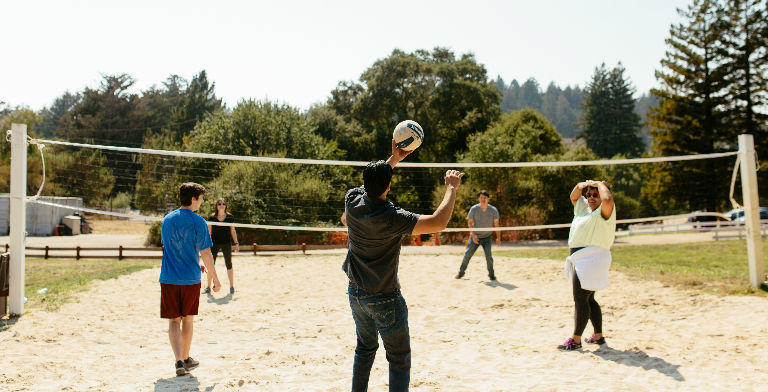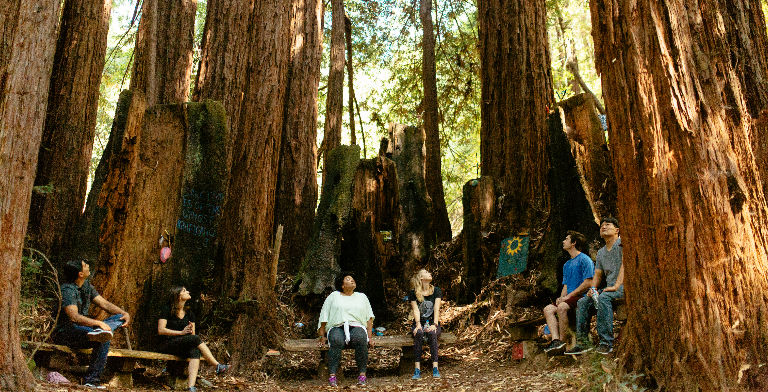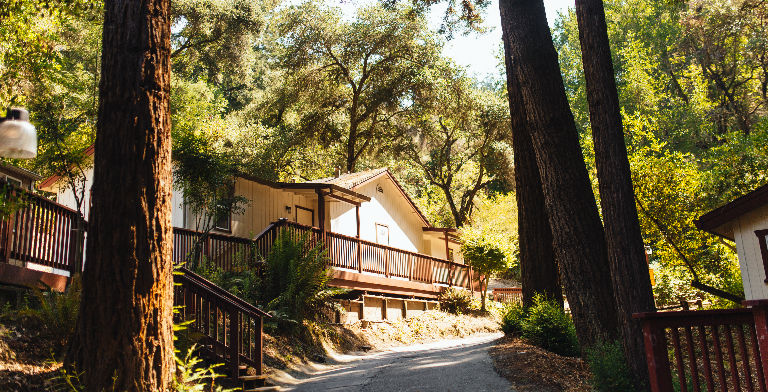The Camp Recovery Center helps adults struggling with GHB addiction find long-term recovery. Located near Scotts Valley & San Jose, CA, The Camp provides premier GHB abuse rehabilitation.
GHB Abuse Rehab
GHB Abuse Rehab Near Santa Cruz & San Jose
Gamma hydroxybutyrate, also known as GHB, is a central nervous system depressant that causes users to be overcome with feelings of euphoria, lowered inhibitions, and an increased sex drive. This substance, which comes in the form of a liquid or powder, is part of a group of drugs that are known as “club drugs.” Also widely known as a date rape drug, GBH can be extremely harmful to a person’s physical and mental health. Though this substance is sometimes used to treat narcolepsy, the abuse of GHB can lead to disastrous outcomes if rehab or treatment is not sought to end this type of substance abuse. Fortunately, there are rehab centers that exist that can help individuals cease their use of this risky substance.
At The Camp Recovery Center, we understand what it means to be caught in the cyclical pattern of GHB addiction, and we have developed highly effective treatment methods to help people make the necessary changes that will allow them to achieve long-term sobriety.
Helping a Loved One
Helping a Loved One or Family Member Enter GHB Abuse Rehab
Family members and friends of a person who is addicted to GHB can be of great assistance in helping the person they care about in defeating a substance abuse problem of this kind. Even if you, as a concerned family member or friend, have attempted to help your loved one in the past, there remains things that can be done to assist a person who abuses GHB in seeking and eventually getting the rehab needed to resume a healthy and sober life. Consider taking the following actions:
- Learn about GHB addiction, including the signs, symptoms, and potential effects that can occur if someone is abusing this substance. Arming yourself with this type of information will offer you insight as far as what your loved one is going through.
- Learn about the health concerns related to GHB addiction or abuse and establish a plan of action should your loved one experience a medical emergency as a result of abusing this drug.
- Talk with your loved one about his or her abuse of GHB. Be prepared should your loved one get defensive or deny his or her use of this drug, yet try your best to have this conversation with an empathic mindset and approach to this topic.
- Research rehab centers that can provide effective care for those who abuse GHB. It could also be especially helpful to find centers who supply care for mental health conditions and substance abuse alike, as these types of providers can offer truly comprehensive treatment.
- Encourage your loved one to engage in a treatment program and suggest that he or she reach out to a provider to ask questions that could alleviate some of the anxiety that he or she may be experiencing regarding the possibility of seeking treatment.
- Offer to go with your loved one to any assessments that are scheduled for admissions to a treatment center. Your loved one may still be apprehensive about going to rehab, however if you are by his or her side during this process, he or she may be less nervous when taking on this new endeavor.
Once your loved one is admitted to a rehab center, it would be wise on your part to consult with your loved one’s treatment providers to learn what you can do to help your loved one be successful while receiving GHB addiction care. You may be encouraged to remain in contact with your loved one, attend family sessions, or seek your own support. Whatever advice your loved one’s treatment providers offer, it is a good idea to take and follow through with their recommendations in order to further your loved one’s recovery.
Why Consider Us?
Why Those Near Santa Cruz & San Jose Should Consider GHB Abuse Treatment at The Camp Recovery Center
A great deal of harm can be caused by an addiction to GHB. Those who engage in this type of substance abuse may experience a variety of social, emotional, physical, and psychological effects; effects that could be irreversible if the abuse of this drug becomes a regular occurrence. Relationships that were once meaningful could become strained, symptoms synonymous with a mental illness could become apparent, and one’s school and/or work performance could become hindered. Generally speaking, GHB’s impact on a person’s brain could lead to diminished cognitive abilities and deficits in memory. With regards to an individual’s physical health, there is a risk for the onset of cardiac problems and contracting sexually transmitted infections as a result of engaging in risky and unprotected sexual behaviors when under the influence of this substance. However, a vital thing to keep in mind is that these detriments can be avoided. By seeking and engaging in rehab, those who abuse GHB, or another club drug, can gain the skills needed to live a healthy and drug-free existence.
Types of Treatment
Types of GHB Abuse Treatment Offered at The Camp Recovery Center
Nestled in the foothills of the majestic Santa Cruz Mountains, The Camp Recovery Center is a place of hope and healing where clinically sophisticated rehab is provided in a serene and secure environment.
For more than 30 years, The Camp has remained dedicated to providing the highest quality of life-changing rehab to adults who are struggling with GHB addiction and other forms of chemical dependency. Individuals who choose to receive treatment at or rehab center have the opportunity to work with talented and experienced nurses, addiction counselors, family therapists, and other professionals whose clinical expertise is surpassed only by their commitment and compassion.
Rehab at our treatment center is a highly personalized experience, with each resident following a plan that has been customized to ensure that we are providing the type and level of care that best meets his or her unique needs. The following are among the many elements that may be included in a resident’s rehab plan at The Camp:
Detoxification: For individuals who have been unable to rid their bodies of substances prior to arriving at The Camp, detoxification can be an essential precursor to full participation in treatment. When a resident is determined to be in need of detox services, we will coordinate with an offsite doctor, typically near the Santa Cruz & San Jose, CA areas, who will develop and approve an appropriate detox protocol. As is the case with all aspects of treatment at The Camp, detox protocols are developed and implemented in the manner that best meets the specific needs of each resident.
Medication management: Residents who are addicted to GHB and suffer from a co-occurring mental health condition may receive a referral to meet with a psychiatrist to determine if prescribed medication should be incorporated into their rehabilitation. Residents who receive medications will meet with the psychiatrist on a weekly basis to monitor their progress and adjust their prescriptions if necessary. Members of our nursing staff also assist in monitoring residents’ medications.
Individual therapy: Residents receiving GHB addiction treatment meet with their case managers two times each week for individual therapy sessions. These sessions allow residents to process their rehab experiences, discuss their progress, and address any concerns have arisen since the previous session.
Group therapy: Group therapy is an essential part of treatment for GHB addiction at The Camp. A variety of groups are scheduled every day, including weekends. Process groups are conducted five days a week. The following are examples of specific groups that may be conducted during a resident’s time at our rehab center:
- Experiential Group
- Focus Groups
- Music / Poetry Groups
- Men’s Group
- Activity Group
- CBT Groups
- Detox Groups
- Women’s Group
The following are a few examples of the many topics that may be addressed in group therapy sessions at The Camp:
- SMART Recovery
- Self-helping thinking
- 12-Step Recovery
- Relapse prevention
Family therapy: Residents receiving treatment for GHB addiction have the opportunity to participate in family therapy sessions twice each month. These sessions, which are led by marriage and family therapists, are designed to facilitate healthy communication among family members, address negative feelings and emotions that exist due to GHB addiction, and promote the healing and strengthening of the family unit. Family therapy sessions take place at our treatment center, which is conveniently located near the Santa Cruz & San Jose, CA area.
Experiential therapy: A variety of experiential therapies are scheduled every week at The Camp. Residents also have the opportunity to spend time in our gym six days a week. Additional experiential therapies at our rehab center include the following:
- Meditation
- Yoga
- Acupuncture
Community meetings: Resident-run community meetings are held every morning, including both weekdays and on the weekends. These meetings, which are a major component of the rehab process at The Camp, provide an opportunity for residents to review the agenda for the day, do readings, and address any issues that are relevant to the group. In addition to being sources of important information, community groups promote healthy independence and interdependence while also facilitating the forming of productive sober relationships that can be essential to supporting long-term recovery from GHB addiction.
At The Camp Recovery Center, we know that residential rehab is just one step on the path of lifelong recovery from a GHB addiction problem. To ensure that every adult who completes treatment with us is best prepared for the next phase of his or her recovery, our case managers work closely with all residents to ensure that sources of continuing care and support have been identified, and all necessary arrangements for accessing this care have been made prior to discharge.
For adult residents who need a more structured level of care during their transition from residential rehab, we also offer intensive outpatient programming (IOP). Our intensive outpatient programming is convenient to the Santa Cruz/San Jose, CA areas.
In the same manner that we provide a highly personalized rehab experience during a resident’s time at The Camp, we are similarly dedicated to ensuring that, as they prepare to leave our center, all residents have a continuing care plan that addresses the specific issues that are essential to their long-term recovery from GHB addiction.
















